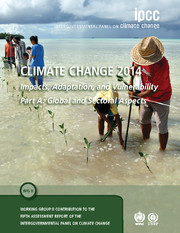 Climate Change 2014 – Impacts, Adaptation and Vulnerability: Part A: Global and Sectoral Aspects
Climate Change 2014 – Impacts, Adaptation and Vulnerability: Part A: Global and Sectoral Aspects Book contents
- Frontmatter
- Contents
- Foreword, Preface, and Dedication
- Summary for Policymakers
- Technical Summary
- Cross-Chapter Boxes
- Chapters 1-20
- Chapter 1 Point of Departure
- Chapter 2 Foundations for Decision Making
- Chapter 3 Freshwater Resources
- Chapter 4 Terrestrial and Inland Water Systems
- Chapter 5 Coastal Systems and Low-Lying Areas
- Chapter 6 Ocean Systems
- Chapter 7 Food Security and Food Production Systems
- Chapter 8 Urban Areas
- Chapter 9 Rural Areas
- Chapter 10 Key Economic Sectors and Services
- Chapter 11 Human Health: Impacts, Adaptation, and Co-Benefits
- Chapter 12 Human Security
- Chapter 13 Livelihoods and Poverty
- Chapter 14 Adaptation Needs and Options
- Chapter 15 Adaptation Planning and Implementation
- Chapter 16 Adaptation Opportunities, Constraints, and Limits
- Chapter 17 Economics of Adaptation
- Chapter 18 Detection and Attribution of Observed Impacts
- Chapter 19 Emergent Risks and Key Vulnerabilities
Chapter 18 - Detection and Attribution of Observed Impacts
Published online by Cambridge University Press: 05 January 2015
- Frontmatter
- Contents
- Foreword, Preface, and Dedication
- Summary for Policymakers
- Technical Summary
- Cross-Chapter Boxes
- Chapters 1-20
- Chapter 1 Point of Departure
- Chapter 2 Foundations for Decision Making
- Chapter 3 Freshwater Resources
- Chapter 4 Terrestrial and Inland Water Systems
- Chapter 5 Coastal Systems and Low-Lying Areas
- Chapter 6 Ocean Systems
- Chapter 7 Food Security and Food Production Systems
- Chapter 8 Urban Areas
- Chapter 9 Rural Areas
- Chapter 10 Key Economic Sectors and Services
- Chapter 11 Human Health: Impacts, Adaptation, and Co-Benefits
- Chapter 12 Human Security
- Chapter 13 Livelihoods and Poverty
- Chapter 14 Adaptation Needs and Options
- Chapter 15 Adaptation Planning and Implementation
- Chapter 16 Adaptation Opportunities, Constraints, and Limits
- Chapter 17 Economics of Adaptation
- Chapter 18 Detection and Attribution of Observed Impacts
- Chapter 19 Emergent Risks and Key Vulnerabilities
Summary
18.1. Introduction
This chapter synthesizes the scientific literature on the detection and attribution of observed changes in natural and human systems in response to observed recent climate change. For policy makers and the public, detection and attribution of observed impacts will be a key element to determine the necessity and degree of mitigation and adaptation efforts. For most natural and essentially all human systems, climate is only one of many drivers that cause change—other factors such as technological innovation, social and demographic changes, and environmental degradation frequently play an important role as well. Careful accounting of the importance of these and other confounding factors is therefore an important part of the analysis.
At any given location, observed recent climate change has happened as a result of a combination of natural, longer term fluctuations and anthropogenic alteration of forcings. To inform about the sensitivity of natural and human systems to ongoing climate change, the chapter assesses the degree to which detected changes in such systems can be attributed to all aspects of recent climate change. For the development of adaptation policies, it is less important whether the observed changes have been caused by anthropogenic climate change or by natural climate fluctuations. Where possible, the relative importance of anthropogenic drivers of climate change is assessed as well.
18.1.1. Scope and Goals of the Chapter
Previous assessments, notably in the IPCC Fourth Assessment Report (AR4; Rosenzweig et al., 2007), indicated that numerous physical and biological systems are affected by recent climate change. Owing to a limited number of published studies, human systems received comparatively little attention in these assessments, with the exception of the food system, which is a coupled human-natural system. This knowledge base is growing rapidly, for all types of impacted systems, but the disequilibrium remains (see also Section 1.1.1, Figure 1-1). The great majority of published studies attribute local to regional changes in affected systems to local to regional climate change.
- Type
- Chapter
- Information
- Climate Change 2014 – Impacts, Adaptation and Vulnerability: Part A: Global and Sectoral AspectsWorking Group II Contribution to the IPCC Fifth Assessment Report, pp. 979 - 1038Publisher: Cambridge University PressPrint publication year: 2014
- 6
- Cited by


